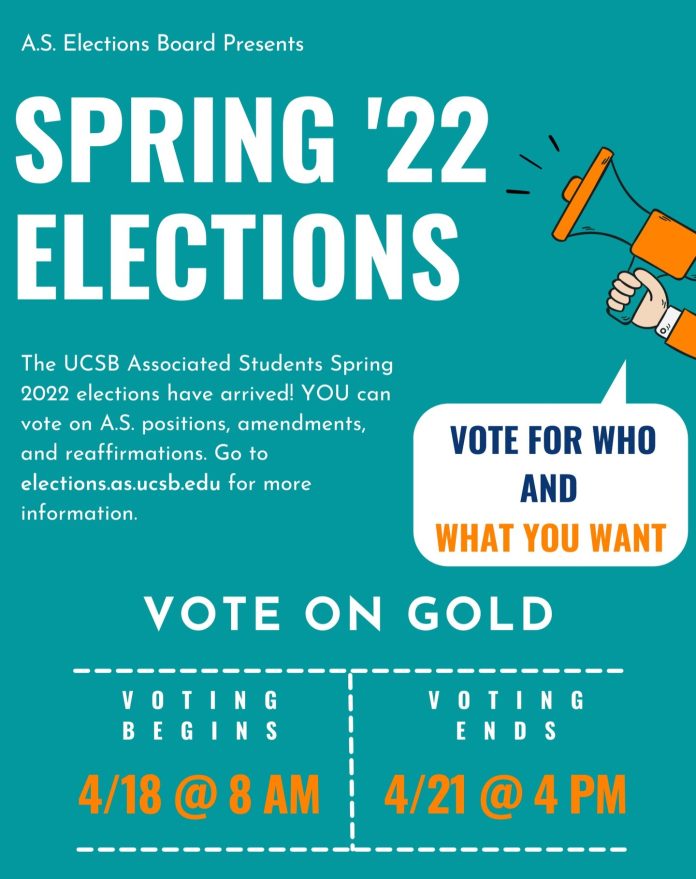Troy Sambajon
National Beat Reporter
Associated Students (AS) 2022 Spring Elections yielded the lowest voter turnout in six years: 20.76 percent which comes out to 4,491 students. Three out of five executive branch positions saw only one candidate running and only 21 senatorial candidates ran overall. Seven AS Senate seats remain empty.
The most common intersecting interests among the incoming executive board include mental health advocacy and campus safety. The volatility of COVID-19, as well as the recent attacks near campus toward the end of winter quarter, have likely motivated these platform points.
Read below to learn about the incoming AS Executive Board and their vision for the following year.
The incoming President, Gurleen Pabla (Storke Party), is most interested in making the campus safer, improving mental health resources, and ensuring that students are properly represented. Several of her campaign points revolve around making sure that student funding is transparent and geared towards necessary services and projects. She wants to move student funding from “decorational buildings” to “necessary infrastructure,” and also wishes to make student funding more transparent. She also wants to make UCSB’s mental health care facilities including Counseling & Psychological Services (CAPS) more accessible and equipped with more effective solutions. To make students feel safer in the wake of both COVID-19 and the attacks in Isla Vista (I.V.) during winter quarter, she wants to secure “cleaning agents” around campus and install cameras in bike lots. Her policies appear to be largely in line with Yuval Cohen’s platforms with a larger emphasis on modifying student funding.
The incumbent (and incoming) Internal Vice President, Bee Schaefer (Independent), has a platform based on accountability and student advocacy. Like Pabla, Schafer also wants to “expand and educate” students on available AS funding. To advocate for students, Schafer plans to install call boxes and more lighting in I.V., instate “racial bias and awareness programs for AS,” and get UCSB’s international and disabled communities more involved in AS. She also wants to hold Exec and Senate accountable for “platform completion,’ as well as “proper representation of [the] Constituency.” This plan would also involve making an internal AS Complaint and Professor Rating form on GOLD to serve as a “confidential feedback mechanism for improvement.”
The incoming External Vice President of Local Affairs, Hailey Stankiewicz (Independent), is most concerned about representation, public safety and basic needs for students. Along with increasing opportunities for UCSB students to speak with administrators and local authority, Stankiewicz also wants to “institute an annual public safety risk assessment report and emergency plan,” and begin a collaboration with the Alcohol and Drug Program (ADP) to provide rohypnol and “other substance testing kits.” To expand student necessities, she plans to work on habitability conditions, to ensure tenants’ rights by keeping track of rent increases, and to alleviate food insecurity for undocumented students. She also hopes to broaden the Restorative Justice Program, to make more public study spaces in I.V., and to support more local artists by putting on free concerts.
The incoming External Vice President of Statewide Affairs, Marvia Cunanan (Isla Vista Party), wants to improve community accessibility and protections for marginalized students. Her first platform point focuses on advocating for “universal design,” making education more accessible for people with different needs. She also wants to make basic needs and mental health resources more available for both students and UC workers. Uplifting community and cultural resource centers, as well as defending land sovereignty, fall in line with her platform, as well. She also wants to provide more opportunities for student involvement in policy making, and direct funding towards disability inclusion without raising student costs.
The incoming Student Advocate General, Kristen Wu (Independent), wants to increase transparency among administrators and influence among the student body. In addition to asking for administrators to share what goes into decisions made for the community, Wu wants to carry on efforts to instate a student committee in the Office of Diversity, Equity, and Inclusion to counter sexual harassment, violence and assault. She also plans to make a confidential complaint form for students to share criticisms of entities including UC Police Department (UCPD), Student Affairs, and other campus and community groups.
The incoming AS senate members have not laid out their plans in as much detail, but many of their campaign platforms center on “allocating more funding and advertisement of student resources, advocating for increased mental health awareness and programs, [and] increasing safety and security of Residence Halls and facilities.”











